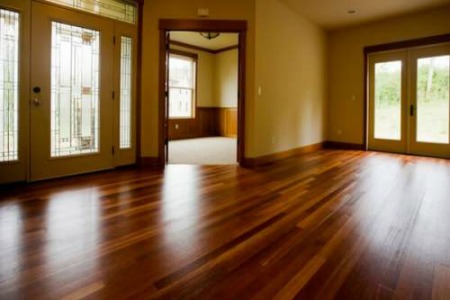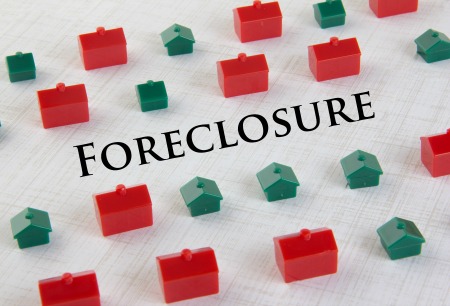There are few experiences in life that create a sense of excitement that is quite like buying a home. Unfortunately, many home buyers let stress and anxiety rob them of the joy they should be experiencing because they don’t understand the home buying process. That’s why we’ve put together this comprehensive guide to buying a home that we hope will help you feel better prepared and more confident in your choices as you move forward.
What Comes with the House You Buy
 Most sellers will do some sort of staging to their home in preparation for open houses and showings. Keep this in mind when you’re touring a home on your watch list. You may adore the way the home is decorated and the style of furniture that is used. The artwork may be just what you’re looking for in the new living room you’ve planned. However, these items most likely do not come with the purchase of the home.
Most sellers will do some sort of staging to their home in preparation for open houses and showings. Keep this in mind when you’re touring a home on your watch list. You may adore the way the home is decorated and the style of furniture that is used. The artwork may be just what you’re looking for in the new living room you’ve planned. However, these items most likely do not come with the purchase of the home.
There are some things that are typically included in the sale of a home. Kitchen appliances like the stove, refrigerator, dishwasher, and built-in microwave oven may come with the property. Hardware such as doorknobs, cabinet handles, and bathroom fixtures are usually included. There are times when drapes or other window treatments are included, especially if they were created specifically for those windows.
Don’t be shy if you see something that you absolutely feel an attachment to when at a showing. Let your real estate agent know, and they can ask the seller if they would be willing to let that item go with the sale. The seller may say no, but at least you gave it a chance.
Click Here to Read More About What Comes With the House You BuyHow to Buy a House with a Real Estate Agent
With all the information you can access with the tap of the finger, you may be tempted to navigate the home buying waters without help. Before you hop on that boat, think about what you know about the real estate market. Now, consider the unfamiliar terminology, real estate laws, negotiations, and closing day preparations. It’s easy to see how having a real estate agent on your side is not just beneficial, it’s necessary.
A real estate agent has access to homes as soon as they hit the market. Once we know what’s important to you when it comes to choosing a home, we can set up alerts that will notify you. You can start the process by signing up for a free account that lets you save your own searches. We’ll be with you during showings and open houses to make sure all your questions get an answer. We handle the paperwork, recommend vendors you’ll need, and negotiate on your behalf when it comes time to discuss offers. We genuinely care about your success during the home buying process.
Click Here to Read More About How to Buy a House with a Real Estate AgentWhat Happens When You Buy New Construction
Many people prefer the charm that comes with a house that has a bit of history, but there’s something to be said about a home that is newly built. As a buyer, you have a say in the floorplan, paint colors, fixtures, flooring, and landscaping. You get to choose where the home is placed in the community and picking your own lot can be part of the fun. You also get to choose the appliances, lighting, and door style. These are all things that give you the ability add your own flair and personality to the home before you move in!
While buying new construction can be exciting, there are critical steps in the process that may leave you feeling overwhelmed if you go it alone. Remember, the builder is representing their own interest. You want someone who is on your side when it comes to upgrades and negotiating terms like completion and move-in dates. While the builder may not budge on the price of the home, a real estate agent may be able to get additional upgrades and incentives as part of the package without you paying more money.
 The builder will have a contract that lays out the timeline for construction and completion. While you can expect some delays to happen along the way, the contract should explain exactly how delays will be handled. After construction is complete, there will be a final inspection. The inspection is meant to alert the builder to any issues that need attention and get the home ready for your arrival. Set up a time to walk through the property with your agent. We are skilled at looking for things that may need to be updated or fixed before closing day. It’s a good idea to take some colored tape to mark areas you feel need attention.
The builder will have a contract that lays out the timeline for construction and completion. While you can expect some delays to happen along the way, the contract should explain exactly how delays will be handled. After construction is complete, there will be a final inspection. The inspection is meant to alert the builder to any issues that need attention and get the home ready for your arrival. Set up a time to walk through the property with your agent. We are skilled at looking for things that may need to be updated or fixed before closing day. It’s a good idea to take some colored tape to mark areas you feel need attention.
Some issues that may be identified during the final inspection include:
- Construction materials left behind
- Unfinished molding and trim
- Flooring problems
- Doors hung improperly
- Cracks in garage floors
- Missing fixtures
- Unfinished spaces around doors and windows
- Incomplete landscaping
Problems found during the inspection and final walk-through should be addressed and resolved before closing.
Click Here to Read More About What Happens When You Buy New ConstructionHow to Buy a House When Selling Another
Many buyers find themselves torn between two homes. You need to find a new house, but you still have to sell the one you currently own. If you have the means financially, you may consider moving forward with the new home purchase while you cover the current mortgage until that home sells. This isn’t a solution for everyone.
Let’s talk about how you can purchase a new home with the contingency built into the contract around selling your current house. Don’t be surprised if a seller chooses not to work within such a deal. Your real estate agent can negotiate on your behalf to try and make this work.
It is possible to buy and sell at the same time, but it takes successful timing. We can help you create a plan of action to hold both closings on the same day. While this isn’t the best option, it may the acceptable one depending on your timeline and situation.
Alternately, you may choose to sell your property and live in a rental home while you search for a new home. For some people, this is the option that makes the most sense, though it does involve more moving and the expenses that come with those moves.
Click Here to Read More How to Buy a House When Selling AnotherHow to Buy a House with Cash
Owning a home comes with a price rag that keeps most people from being able to purchase the property with cash. For some people, the idea of having a 30-year commitment to a mortgage company and paying the interest on that loan is less than ideal. For this reason, some people do opt to purchase a home using cash.
Before deciding if cash is the best option for you, meet with a real estate agent to discuss the pros and cons. Research what it means for you financially and consider your income, assets, and financial obligations. Don’t forget to consider the future property taxes, maintenance costs, and repairs that may be needed as time passes. If you proceed with the purchase, you’ll likely need a cashier check from your bank for closing day.
Click Here to Read More How to Buy a House with CashHow to Buy a Foreclosure
 Buying a foreclosure home has a different set of steps than a typical home buying process. If you are interested in going this route to purchase a home, speak with a real estate agent and be prepared to expect that you’ll likely be working with a single real estate agent, you’ll need a pre-approval letter from a mortgage company, you won’t have much room for negotiating, and the home will typically be sold as-is.
Buying a foreclosure home has a different set of steps than a typical home buying process. If you are interested in going this route to purchase a home, speak with a real estate agent and be prepared to expect that you’ll likely be working with a single real estate agent, you’ll need a pre-approval letter from a mortgage company, you won’t have much room for negotiating, and the home will typically be sold as-is.
You will want a real estate agent to work with you throughout the process. Apply for a mortgage loan pre-approval so you’ll have that letter on hand. Ask your real estate agent to provide information about the real estate market in the location of the property. You want to make sure the offer you make is suitable for the market and area. Also, make a list of things that will need attention should the sale close.
Click Here to Read More on How to Buy a ForeclosureHow to Buy a For Sale by Owner
While most sellers have a real estate agent to represent their interest, there are some sellers who prefer to go it alone. Don’t let this keep you from having a real estate agent on your side. You want someone who understands the legal aspects and can offer a bit of protection in the way of a warning should you step into dangerous territory with a proposed contract clause. Your agent can offer insight on whether the asking price is right and help you create an offer that gets the seller’s attention. Again, you’ll want to apply for a mortgage loan pre-approval so you have that target price range and some assurance that you can proceed when everything is ready to go.
Some common issues you may encounter when buying a FSBO home include:
- The listing agent will hold money in an escrow account. If there is no agent, you may need to arrange for an attorney or title company to act as the escrow agent.
- You should request from the seller a C.L.U.E. report. This report will reveal any insurance claims made on the property within five years. If there are no issues, and the seller has nothing to hide, then they shouldn’t have a problem requesting the report and handing it over to you.
- A home inspection is necessary. Even if the seller is honest, he or she may not know if there are hidden problems with the home. There could be issues with mold or water damage that is not visible. An inspector will check the wiring, plumbing, and entire structure. You can also request they check for asbestos, radon, and electromagnetic fields.
What Does it Cost to Close on a House?
While the seller may decide to pay all or part of the closing costs as part of the deal, you should be ready and able to pay them. Your mortgage lender will give you a Good Faith Estimate (GFE) of these closing costs after your offer is accepted. Keep in mind that this is just an estimate and the amount can change significantly by the time you reach closing day.
Typical closing costs for the buyer include:
- Down Payment – This can be zero to 20 percent of the home’s purchase price.
- Origination Fee – This fee is what your lender will charge to process your loan.
- Title Insurance – Protects the new owner from claims against the property, such as liens, encumbrances or defects in the title to the property.
- Recording Fees – This fee is charged by your jurisdiction to record the transaction at your local courthouse.
- Home Inspection – You’ll need to pay a third party to inspect the home for major defects.
- Appraisal Fee – You’ll need to pay a third party to appraise the home as requested by your lender.
- Escrow Fees – You will be required to prepay mortgage insurance and property taxes which will need to be paid at closing.
These are just a few of the possible closing costs a home buyer may be expected to pay. Just before closing day, your mortgage lender will give you a final account of actual costs. Closing day is the day you’ll be most excited about when it comes to the home buying process. That’s the day that you pay any money owed, sign remaining paperwork, and receive the keys to your new home!
Click Here to Read More on What Does It Cost To Close on a House In Michigan?The best source of information about local communities and real estate topics is your real estate agent. Give Joshua Norber of the Norber Real Estate Group a call today at 248-785-3737 to learn more about the area, discuss selling your house, or tour available homes for sale.
![[Metro Detroit Real Estate 2020]](https://jknorber.com/wp-content/uploads/2022/04/eXpRealty.jpg)